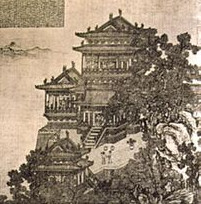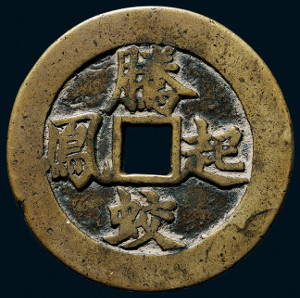Wang Bo (王勃) was a Tang dynasty poet and is considered one of the Four Paragons of the Early Tang (初唐四杰).
His masterpiece is the Preface to the Prince of Teng’s Pavilion (tengwang ge xu 滕王阁序) which describes the scene at a grand banquet he attended at the Pavilion of Prince Teng.
The Pavilion of Prince Teng (滕王阁) is located in Nanchang (南昌), Jiangxi Province (江西省). Prince Teng (李元婴) was the younger brother of Emperor Taizong (唐太宗) of the Tang dynasty (唐朝 618-907).

Song dynasty painting of the Pavilion of Prince Teng
Construction of the pavilion began in the year 653.
In 675, Wang Bo wrote the poem that would commemorate the pavilion to this day.
At the left is a painting of the Pavilion of Prince Teng as it appeared during the Song dynasty (宋朝 960-1279).
Over the centuries, the pavilion would serve as the venue for banquets attended by noblemen, artists and even emperors.

“Dragon soaring and phoenix dancing” charm
Shown here is a Qing dynasty (清朝 1644-1911) charm with the inscription teng wen qi feng (腾蛟起凤) which translates as “a dragon soaring and a phoenix dancing”.
“Dragon soaring and phoenix dancing” is a phrase found in this excerpt from Wang Bo’s poem:
十旬休假,胜友如云;千里逢迎,高朋满座。腾蛟起凤 , 孟学士之词宗;紫电青霜,王将军之武库。家君作宰,路出名区;童子何知,躬逢胜饯.
“On this official holiday, which falls on every tenth day, good friends gather together, and a galaxy of distinguished guests from distant places fill the hall. Also present at the gathering, are Master Meng, whose literary grace is as imposing as a dragon soaring and a phoenix dancing, and the General Wang, who has weapons as sharp as the famous swords “Purple Lightning” and “Blue Frost” in his armory. I, as an immature young man, have the good fortune to take part in this grand banquet on my journey to visit my father, who is a magistrate of a county.”
Wang Bo used the descriptive phrase “dragon soaring and phoenix dancing” (腾蛟起凤) to praise the literary works of the banquet guest Master Meng. The phrase refers to a person having exceptional literary or artistic talent.

“Purple Lightning and Blue Frost” refers to two famous ancient Chinese swords
The inscription on the reverse side of the charm, shown at the left, is zi dian qing shuang (紫电青霜) which translates as “Purple Lightning and Blue Frost”.
According to the Baidu Encyclopedia (百度百科):
紫电,青霜,古宝剑名也。传三国时吴主孙权有宝剑六柄,其二曰紫电。
“Purple Lightning and Blue Frost were the names of ancient precious swords. According to legend, Sun Quan (孙权), who was the leader of the Eastern Wu (吴国) during the Three Kingdoms (三国), possessed six swords (六柄宝剑) of which the second was named Purple Lightning (紫电).”
His other five swords were named “White Rainbow” (白虹), “Eliminating Evil” (“Banisher of Evil” 辟邪 ), “Shooting Star” (“Star Rider” 流星), “Night Sky” (“Qing Ming” 青冥 ) and “Hundred Li” (“Hundred Miles” 百里).
Unfortunately, all six of these famous swords have been lost to history.
Regarding the “Blue Frost” sword:
Emperor Gaozu of the Han (Liu Bang) cut (in two) a white snake. The edge of the sword showed blue frost. Consequently, ‘Blue Frost’ was taken to be the name of the precious sword.
Liu Bang (刘邦), the first emperor of the Han dynasty (汉朝 206 BC – 220 AD), owned a sword with the Chinese characters chi xiao (赤宵) engraved on it. The Chi Xiao Sword (赤宵剑), which translates as “Red Night Sword”, is one of the Ten Famous Swords of ancient China.
Liu Bang used this sword to cut in two a very large white snake (汉高祖醉斩白蛇). Because the edge of the sword was said to resemble blue frost, the sword became known as “Blue Frost” (霜雪).
In Wang Bo’s poem, General Wang is praised for having swords in his arsenal as sharp as the famous “Purple Lightning” and “Blue Frost” of old.
As mentioned in the poem, Wang Bo stopped to attend the grand banquet at the Pavilion of Prince Teng while travelling to visit his father. His father actually lived in present-day northern Vietnam which was part of China during the Tang dynasty.
Not long after departing the banquet, Wang Bo tragically drowned in the South China Sea. He was only 26 years of age but his timeless poem, including the inscriptions found on this charm, is the legacy of one of the great poets of the Tang dynasty.